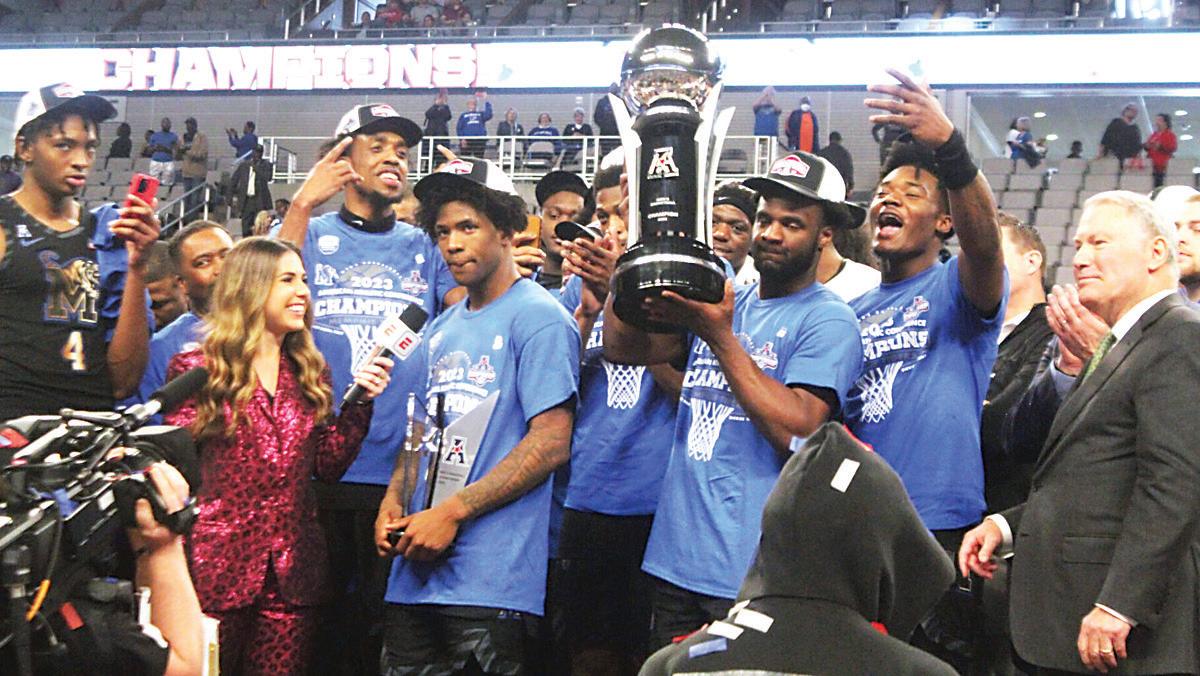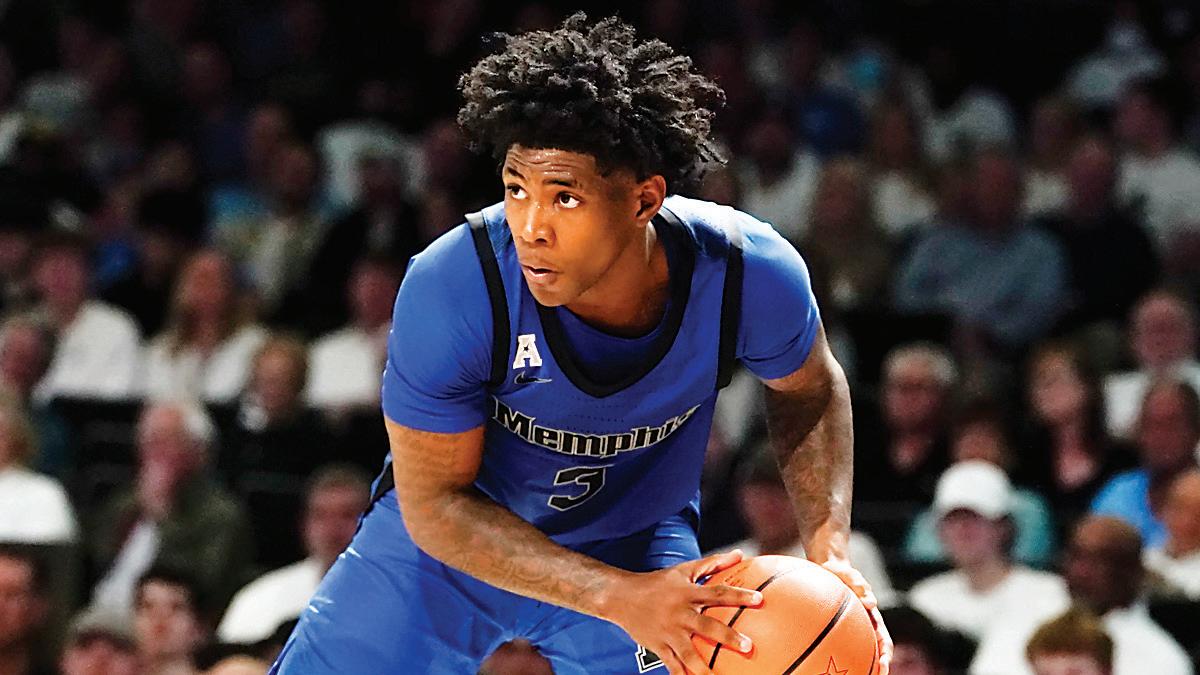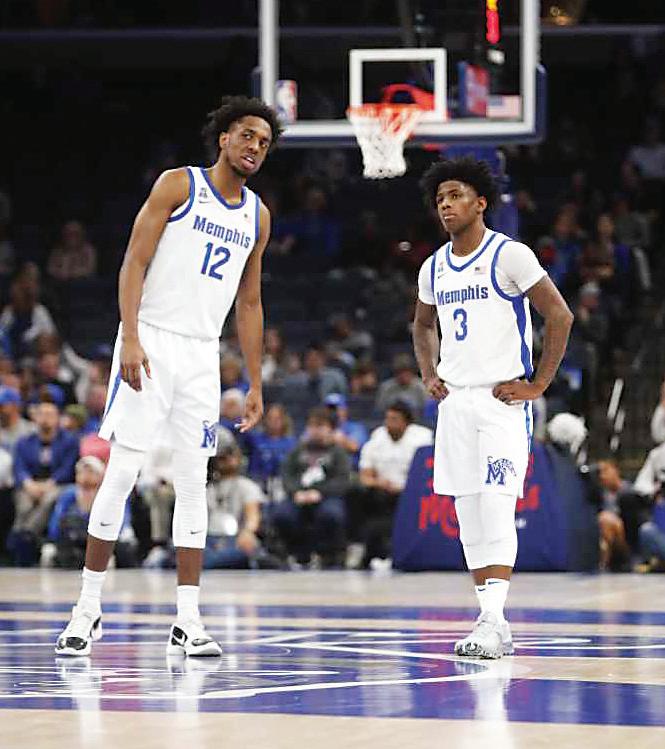
4 minute read
Primer campeonato de conferencia en una década y eliminación temprana
en la NCAA: Así fue la temporada de los Tigers
First Conference Tournament Championship in a Decade and Early NCAA Elimination: This was the Tigers’ Season
Advertisement
Un dramático cierre contra Florida Atlantic puso fin a la temporada de los Tigers en el March Madness, que cayeron en la ronda inaugural del Torneo de la NCAA, al que asistieron por segunda temporada consecutiva.
Aunque la eliminación en primera ronda representó un golpe a la ilusión de Memphis, el duelo contra FAU era uno de los más parejos para la primera ronda del torneo al enfrentar al número #8 contra el #9.
Los Tigers ganaban el juego por 65 a 64 cuando faltaban 16.7 segundos para terminar. Kendric Davis perdió el balón intentando dar un pase adelantado y se desató el caos. A falta de 5.9 segundos, Memphis recuperó la bola en la pintura y todo el equipo pedía tiempo fuera, pero la solicitud fue ignorada por los árbitros en una jugada que le devolvió la posesión a FAU.
Acto seguido, una bandeja de Nick
Boyd a falta de dos segundos decretó el triunfo para Florida Atlantic.
Así, con desilusión y caras largas acabó una travesía que, de nuevo, devolvió al programa de la UofM a estar entre los mejores equipos del país.
¿Cómo fue el año de los Tigers?
Luego de ocho años sin aparecer en el torneo de la NCAA, el 2022 fue un alivio para los Tigers, pero tras la caída frente a Gonzaga parecía que la posibilidad de volver a ese escenario en 2023 se esfumaba.

Jalen Duren se declaró para el draft de la NBA y llegó a los Detroit Pistons, mismo camino elegido por Lester Quiñones, quien hoy en día juega en la G-League. Landers Nolley II, Earl Timberlake, Josh Minott y Tyler Harris también dejaron el programa.
¿Cómo iba a solucionar Penny Hardaway esas pérdidas claves? Las respuestas fueron Kendric Davis, quien se convirtió en la estrella del equipo, y el jugador de mayor edad en el torneo de la NCAA, DeAndre Williams, quien pasó de 11,1 puntos por juego a 17,8, así como de 5,8 rebotes a ocho por noche.
El andar de los Tigers no fue sencillo. Para el 15 de enero, el equipo de Hardaway no se podía dar el lujo de perder más juegos luego de un accidentado comienzo en la Conferencia Atlética Americana.
Por fortuna, Memphis finalizó con récord de 13-5 solo por detrás de Houston, el rival a vencer en el torneo de la Conferencia y al que no habían podido doblegar en dos duelos previos.
Contra los temidos Cougars en el juego clave del 12 de marzo, los Tigers respondieron con un show de Davis y sus 31 puntos, cinco rebotes y tres asistencias, acompañado por 16 de Williams y 10 de Alex Lomax, superando por 75-65 a un rival que disputó el Final Four hace apenas dos años.
Fue el primer campeonato de conferencia para el programa desde 2013 e ilusionaba a Memphis a buscar igualar su mejor resultado en un torneo de la NCAA, la final de 2008, pero la temprana eliminación dio por finaliza- do ese sueño.

“Penny Hardaway ha hecho un gran trabajo al traernos de vuelta a este nivel”, reconoció Laird Veacth, director atlético de UofM, quien brindó flores a su coach con récord de 108 victorias y 51 derrotas en cinco años, en los que desapareció la sequía de March Madness que parecía interminable. “Fue genial para la ciudad”, confesó.
ENGLISH
A dramatic and controversial closeout against Florida Atlantic ended the season at March Madness for the Memphis Tigers, who fell in the opening round of the NCAA Tournament, which they attended for the second consecutive season.



Although the elimination in the first round represented a blow to the ultimate goals for Memphis, the game against FAU was one of the closest for the tournament’s first round when facing number #8 versus #9.
Continued on page 38
The Tigers led the game 65-64 with 16.7 seconds to go. Kendric Davis fumbled, attempting a forward pass, and chaos ensued. With 5.9 seconds to go, Memphis got the ball back in the paint, and the entire team called timeout, but the officials ignored the request on a play that returned possession to FAU.
Immediately afterward, a layup by Nick Boyd with two seconds remaining declared the victory for Florida Atlantic.
Thus, with disappointment and long faces, a journey ended that, once again, returned the UofM program to be among the best teams in the country.
How was the year for the Tigers?
After eight years without appearing in the NCAA tournament, 2022 was a relief for the Tigers, but after the loss against Gonzaga, it seemed that the possibility of returning to that stage in 2023 was gone.
Jalen Duren declared for the NBA draft and came to the Detroit Pistons, the same path chosen by Lester Quiñones, who plays in the G-League today. Landers Nolley II, Earl Timberlake, Josh Minott, and Tyler Harris also left the program.
How was Penny Hardaway going to fix those key losses? The answers were Kendric Davis, who became the tea7m’s star, and the oldest player in the NCAA tournament, DeAndre Williams, who went from 11.1 points per game to 17.8, as well as 5, 8 rebounds to eight per night.
The Tigers’ gait took work. By January 15, Hardaway’s team could not afford to lose more games after a rocky start in the American Athletic Conference.
Fortunately, Memphis finished with a 13-5 record behind only Houston, the rival to beat in the Conference tournament and whom they had not been able to defeat in two previous duels.

Against the feared Cougars in the vital game on March 12, the Tigers responded with a show from Davis and his 31 points, five rebounds and three assists, accompanied by 16 from Williams and ten from Alex Lomax, beating 75-65 a rival who played in the Final Four just two years ago.
It was the first conference tournament championship for the program since 2013. It had Memphis looking forward to matching its best finish in an NCAA tournament, the 2008 final, but early elimination ended that dream.
“Penny Hardaway has done a great job bringing us back to this level,” acknowledged Laird Veatch, Director of Athletics at UofM, who offered flowers to his coach with a record of 108 wins and 51 losses in five years, in which the March Madness drought that seemed endless disappeared. “It was great for the city,” he confessed.

